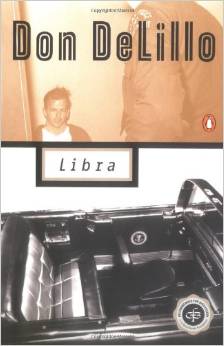Every summer, my extended family gathers for a mountain vacation in Northern New Mexico or Southwest Colorado. Boating, hiking, fishing, kids playing in the woods, campfires, and reading. Lots of reading. I’ve been reading books on the porches of mountain cabins for more than 10 years now.
On this year’s vacation I read Libra by Don DeLillo. Published in 1988, Libra is a piece of speculative fiction about the events leading up to the assassination of President Kennedy. The novel focuses on Lee Harvey Oswald, blending fact with fiction. It was nominated for the National Book Award that year and makes its share of lists of the greatest novels of the 1980s.

As with everything DeLillo, I’m pretty blown away by this book, and would like to quote for you from page 261, about an odd habit of a minor character.
The character (named Beryl) gets out newspapers and scissors every night and cuts out clippings from the newspaper. She then sends those clippings to her friends. By itself, that is the sort of quirky trait that makes for memorable characters. In Delillo’s hands, this quirky trait turns into something wonderful. Here’s the quote:
There were a thousand things to clip and they all said something about the way she felt. He watched her read and cut. She wore half-glasses and worked the scissors grimly. She believed these were personal forms of expression. She believed no message she could send a friend was more intimate and telling than a story in the paper about a violent act, a crazed man, a bombed Negro home, a Buddhist monk who sets himself on fire. Because those are the things that tell us how we live.
Setting aside the beautiful writing and the poignancy of the last line, what really struck me about this passage was that it was written in 1988, about life in the 1960s! Without knowing he was doing it, DeLillo was making a pointed social comment on a future where we all would share links to news stories on our Twitter accounts and Facebook timelines, doing so because these stories that tell us how we live are intimate and telling.
When Jules Verne writes about submarines decades before the first submarine appears, I’m impressed. When Don DeLillo not only writes about our future social customs, but does so in a way that makes the reader stop and reflect about the meaning of what we’re all sharing on social media, and does it all 30 years before Facebook even exists, I’m blown away.
Great fiction not only tells us the truth. It tells us truth so universal it can predict the future.
